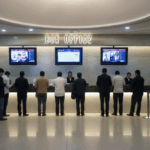Malabar Group has signed a Memorandum of Understanding (MoU) with the World Health Organization (WHO) India to launch Nurturing Beginnings, a new Corporate Social Responsibility (CSR) project aimed at improving the nutrition and overall well-being of mothers and children from underprivileged urban communities.
The agreement was formalized at Malabar Group’s headquarters in Kuttikkatoor, Kozhikode, where Chairman M.P. Ahammad and WHO India Representative Dr. Roderico H. Ofrin signed the MoU in the presence of senior dignitaries, including Dr. B. Muhammad Asheel, National Professional Officer of WHO; Asher O, Managing Director–India Operations, Malabar Gold & Diamonds; Nishad A.K, Group Executive Director; and NGO “Thanal” Chairman Dr. V. Idrees. The initiative will be implemented through the Malabar Charitable Trust.
The Nurturing Beginnings project builds on Malabar’s flagship Hunger Free World program, with a strong focus on the first 1,000 days from conception to early childhood—widely recognized as the most critical period for physical, mental, and intellectual growth.
Under the project, mothers and children will receive free nutritious meals and access to essential healthcare services to support both physical and mental health. The program will initially be launched in Delhi and gradually expanded across other Indian states.
Commenting on the launch, Malabar Group Chairman M.P. Ahammad said: “Only when children receive proper nutrition from conception through early years can they reach their full potential. Sadly, many in our society are deprived of this. By collaborating with WHO India, we are taking a step toward building a healthier society. We are grateful to WHO for its support.”
Dr. Roderico H. Ofrin, WHO Representative to India, praised the initiative: “Nutrition and care are fundamental rights of mothers and children. Malabar Group’s commitment to this project reflects its vision for a healthier future generation. WHO is proud to support this vital initiative.”
Dr. P. Muhammad Asheel added: “This project has the potential to transform child development in economically weaker communities. WHO India will extend all cooperation to ensure its success.”
Since its inception in 1993, Malabar Group has dedicated 5% of its profits to CSR activities. Its ongoing Hunger Free World initiative provides free meals to 60,000 people daily across India and 10,000 students in Zambia. The Group has also set up over 700 micro-learning centers for street children and school dropouts, bringing nearly 30,000 children back to school.
Other initiatives include Grandma Home for destitute mothers, a long-running scholarship program that has benefitted over 1.15 lakh girl students since 2007, and plans to distribute 33,000 more scholarships this year. Malabar’s CSR efforts also extend to healthcare, housing, women’s empowerment, education, and environmental sustainability.





